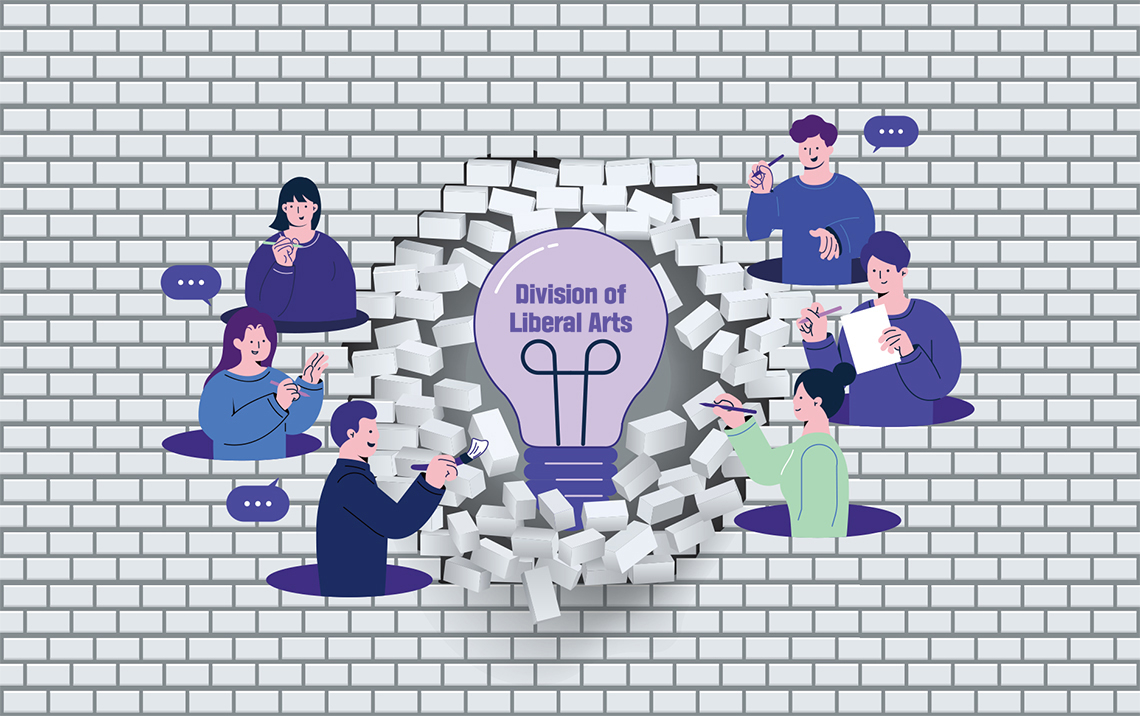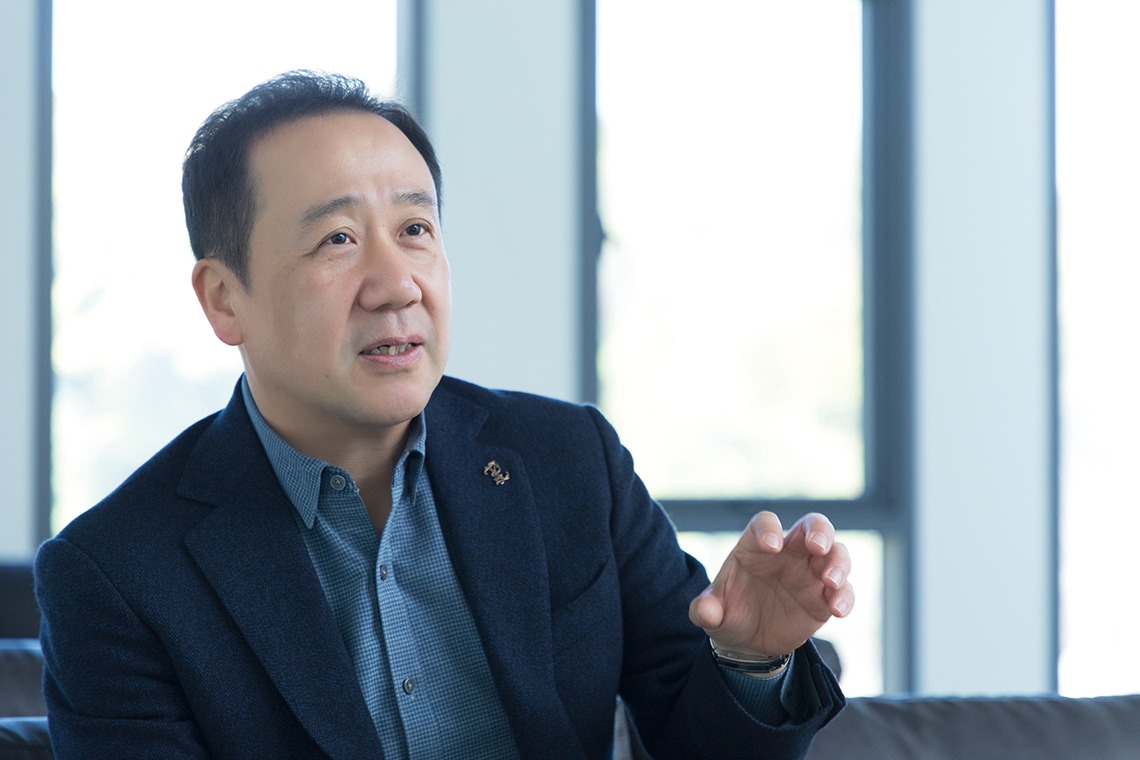
Transforming into a university centered on education demand
According to Vice President Jee Woo Choi, “The world is changing so rapidly that it is increasingly difficult to predict the future, but the department-oriented university organization has not changed since universities were first established in Korea. In a rigid organizational system, it is difficult to foster talent needed in today’s changing society. We therefore need to change into a flexible organization.”
In June 2023, the Ministry of Education decided to abolish some restrictions of department and school systems with a current enforcement decree so that universities can operate their own academic systems autonomously. The fundamental organizational system of a university, which consists of departments and schools, is being reorganized for the first time in over 70 years. This does not end with simple reorganization. As it will bring about innovation of the university education system, huge impacts are expected. Above all, it is expected that the system will be reformed to focus more practically on education demand.
VP Choi continued, “Until now, students chose a department based on their aptitude or scores. When they enter college in this way, they will be stuck with that major their whole life. However, in the Division of Liberal Studies, students are exposed to a variety of disciplines after entering college, explore them, and decide on their major afterwards. This will make a significant difference. It means that the universities, which used to focus on the school and instructors, will change to focus more on students. A new, innovative education system that is completely different from the current education system will be created. The Division of Liberal Studies will be the basis for ERICA’s education innovation.”
However, domestic universities have introduced the new system a few times in the past, and each time, they returned to the former department system. How can the Division of Liberal Arts avoid following in the footsteps of the previous failed attempts?
“The previous college system maintained the department system and assigned departments based on students’ grades after admission by the college. Therefore, there were cases where students dropped out if they were assigned to a department they didn’t really want to be in. This kind of system does not give students a choice of major. What differentiates the Division of Liberal Arts is that it guarantees students the right to choose their desired major. This may cause problems for classrooms as students will flock to popular departments and specific courses. But to solve this potential problem, we are building an online/offline hybrid lecture system called HyFlex.”


Jee Woong Choi, Vice President
of Education Innovation
Big changes at ERICA
Currently, strong consensus is forming internally and externally on the need for innovation in university education. The “Glocal University 30“ project to support regional universities is being implemented by 2026, and the key objective is to break down the obstacles departments and majors face within their university. In addition to nurturing high-tech industry talent, an active and flexible academic system will also be introduced. It is very important for universities in Seoul and the metropolitan area to respond to these changes. Accordingly, ERICA recently established the Office of Education Innovation in July 2023 and is preparing to launch the Division of Liberal Arts. The university will focus most on setting ERICA’s own direction of innovation by establishing an educational system that focuses on education demand, and building consensus among all members.
First, starting with the new students enrolled in 2025, ERICA plans to recruit 15% of the admission quota, except for special fields such as art, physical education, and pharmacy, into the Division of Liberal Arts. Although the details are still being discussed, the basic direction of operations will be “job-related modular curriculums.” This means that students will be recruited in integrated academic disciplines, and they will be able to take courses in the field they want in either the humanities or the natural sciences but will still complete a modular major curriculum.
“Course selection will be done based in modules rather than for department majors. For example, if a student is interested in semiconductors, he or she can take semiconductor-related classes in a modular manner across various departments such as Electronic Engineering, Materials Engineering, Physics, and Photonics and Nanoelectronics. The completed modular curriculum will then be reviewed by the Major Review Committee to decide on a major.”
When students enroll in the Division of Liberal Arts, they will obtain basic knowledge in the first year and take courses to explore what they can learn and what fields they can go into for each major. During this time, experts will provide close support so that the students can systematically select a curriculum suited to their aptitude and desired career. This is to prevent a situation where students are not able to receive a major by taking courses without planning. ERICA plans to employ “academic advisors” to help students who need help in selecting classes and “career advisors” to support career planning and portfolio management. These assistants will continuously provide professional consulting to students in the Division of Liberal Arts.
Furthermore, when students select a major at the end of their first year, they will follow a modular curriculum linked to their major to develop capabilities in their respective fields. Not only can they design a major on their own, but they can also change majors. The title of the majors can be different from what they are now or there can be new departments that are not currently at ERICA.
Five competencies of talent needed today


ERICA’s education innovation strategy
Leading university innovation with “Big BLUR”
The Office of Education Innovation was established to fundamentally innovate the existing university system in addition to simply introducing the Division of Liberal Arts.
“We are planning to make major changes to the liberal arts courses that must be taken in the first year. In order to become the talent needed by society, regardless of major, students must possess five competencies: coding for digital literacy, management and marketing competencies to be a prospective entrepreneur, design sense, design thinking, and global competencies. We plan to organically connect these five areas through liberal arts classes which will be open not only to students in the Division of Liberal Arts, but to all students.”
ERICA’s education innovation strategy in a nutshell, is a “Big BLUR.” In other words, it means, breaking down the borders between online and offline, between majors, and between departments, colleges, universities, and even countries by building a convergence academic system that focuses on education demand. This is where ERICA’s differentiated strategy based on practical talent and excellent industry-academia cooperation is expected to deliver results
“The role of universities in this era is to supply the right talent in the right place in society. ERICA’s education philosophy is to cultivate practical talent based on industry-academia cooperation. Therefore, we will reform the educational system accordingly and be a first mover that leads innovation in domestic university education.”





